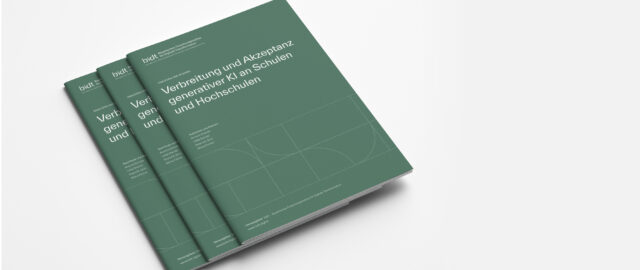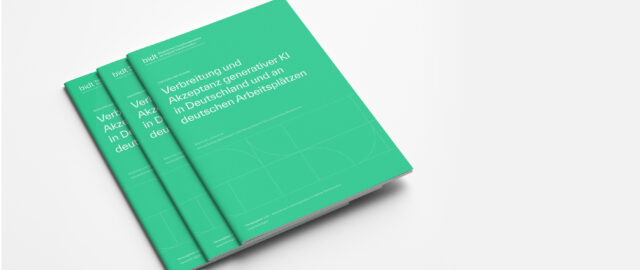
Antonia Schlude
Researcher Think Tank, bidt
Antonia Schlude is a Researcher at the bidt Think Tank. She studied Political Science at the University of Göttingen, the Jagiellonski University of Krakau as well as the Ludwig-Maximilians-Universität in Munich. During her studies, she gained valuable practical experience in various security and defence policy consultations as well as a thorough knowledge of political theory.

Prevalence and acceptance of generative AI at schools and universities
The study examines the use, perception, and concerns regarding generative artificial intelligence among pupils at school and university students.

Working from home is increasingly becoming a competitive factor for companies
A new study by the bidt shows:
The offer of working from home is a decisive factor for the acquisition and retention of employees and their identification with the company.

Prevalence and acceptance of working from home at the end of 2023
The ninth survey on the topic of home office (September 12–22, 2023) examines, among other things, corporate identification and the significance of working from home for employee recruitment.

New bidt study: Generative AI is significantly changing the working environment
A new study by bidt shows: Generative artificial intelligence (AI) such as ChatGPT has spread rapidly in German workplaces. Current figures on usage, satisfaction and risk awareness.

Prevalence and acceptance of generative AI in Germany and in German workplaces
Generative artificial intelligence is becoming increasingly important in the working environment. The study examines the use, perception and concerns about generative artificial intelligence.

“bidt-Digitalbarometer.international”: Germany lags behind in digital skills
The new “bidt-Digitalbarometer.international” reveals that the German population has weaker digital skills compared to other European countries.

bidt-Digitalbarometer.international
The German population lags behind in digital skills compared to other European countries, according to the new “bidt-Digitalbarometer.international”.

Increased Digitalisation as a Result of the Coronavirus? Home office in October 2022
The eighth home office survey (14-28 October 2022) examines the prevalence and acceptance of home office in Germany against the backdrop of the current energy crisis.

Prevalence and acceptance of home office in Germany
The bidt conducted several short surveys providing insights into the prevalence and practice of home office in Germany (in the wake of the coronavirus pandemic).

The bidt-Digitalbarometer
As a representative population survey, the bidt-SZ-Digitalbarometer provides data on digital transformation in Germany.

Critical infrastructure
Organisations and facilities of outstanding importance for supply security on a societal level are called critical infrastructures.

Digitalisation at universities due to the coronavirus (DiHS.c)
The collaborative project being undertaken by the IHF and the bidt examines the impact of the corona pandemic on the digitalisation of universities.

Increased Digitalisation as a Result of the Coronavirus? Home office in March & June 2022
The sixth (03.-20.03.2022) and seventh (22.-29.06.2022) surveys examine the practice and acceptance of home office in Germany against the background of the expired home office obligation in March 2022.

bidt-SZ-Digitalbarometer
The digital transformation is rapidly changing all areas of our lives. Time to take stock: In a joint study, bidt and the SZ Institute of the Süddeutsche Zeitung surveyed more than 9,000 people in Germany on digital skills,…

Increased Digitalisation as a Result of the Coronavirus? Home office in September/October 2021
The fifth survey (20.09.-10.10.2021) examines the use and acceptance of home office in Germany against the background of the political upheaval and the coalition negotiations between the SPD, Bündnis 90/Die Grünen and FDP.

The pandemic as a driver of the digital transformation of universities?
The outbreak of the corona pandemic also upended the organisation of research and teaching at German universities: Academic life was almost completely shifted into the digital space. The study explores the question of whether…

Increased Digitalisation as a Result of the Coronavirus? Home office in May 2021
The fourth survey (06-28 May 2021) examines the impact of the revision of the Infection Protection Act, which came into force on 23 April 2021.

Increased Digitalisation as a Result of the Coronavirus? Home office in February 2021
The third survey (04-08 February 2021) examines the impact of the SARS-CoV-2 Occupational Health and Safety Regulation, which came into force on 27 January 2021.

Working from Home: New Normal for Employees?
What seemed unthinkable a few years ago is now being discussed as the new normal: Since the outbreak of the corona pandemic, many employees are increasingly working from home – and it is already becoming apparent that…

More digital than expected? The 65+ demographic on the Internet
Older people are on the internet almost as often as other age groups, but the type of internet use differs in detail. In addition, the 65+ age group estimates their digital skills to be significantly lower.

